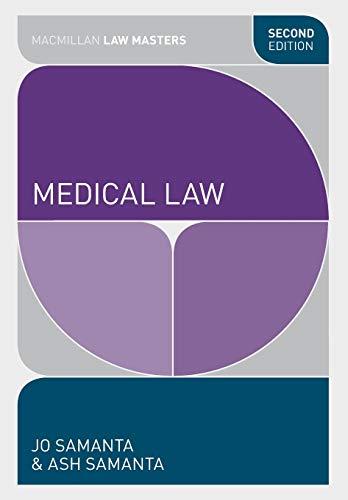Question
Richard is in a dispute with Henry, the owner and proprietor of a club called 'Henry's Bar and Bistro'. Henry's Bar and Bistro are a
Richard is in a dispute with Henry, the owner and proprietor of a club called 'Henry's Bar and Bistro'. Henry's Bar and Bistro are a licensed premises for the purposes of serving alcohol. Henry had allowed Richard to operate a restaurant in an area on the first floor of the club. Henry had further agreed to allow Richard to use an adjoining room within the club building on weekends and when extra seating capacity was needed. Richard spent a considerable sum of money to furnish and fit-out the restaurant. Further regarding the adjoining room, Richard spent money on custom-built seating that was both aesthetically pleasing while being removeable if the area was required for larger events. Alcohol was freely served in the restaurant and the adjoining room. Two separate documents were generated: a written lease for the restaurant area and a written agreement for the adjoining room. However, Henry and Richard never formally signed any of the two documents. Since the parties had known each other for several years, the ad hoc arrangements continued for a few years. Occasionally, Richard reminded Henry about the unsigned agreements, but Henry always ignored or deflected the reminders. Eventually, Richard and Henry developed personal differences and matters escalated to a point where Henry demanded that Richard discontinue the restaurant business and vacate the premises. Richard claims that he owns a leasehold interest in the restaurant area and the adjoining room on the first floor. Henry, on the other hand, argues that Richard did not acquire any leasehold interest in the restaurant area and, further, the use of the adjoining room itself was illegal under Section 153 (1) (a) of the Liquor Act 1992 (QLD).1 Henry claimed that he was the licensee of the premises for the purposes of the Liquor Act and no approval from the Commissioner of Liquor and Gaming for serving alcohol in the adjoining room. Henry is arguing that violation of Section 153 (1) invalidates any lease or agreement that may have been formed between the parties. Therefore, according to Henry the lease for the restaurant and the agreement to use the adjoining room are both void and unenforceable. Richard argues that contravention of Section 153 (1) (a) was entirely due to the failure of the Henry to obtain requisite approvals from the Commissioner of Liquor and Gaming, prior to Henry allowing Richard to possess the part of the licensed premises where the restaurant was located. Richard's argument is that holding the lease for the restaurant as void and unenforceable will cause serious prejudice to him. Richard had spent a considerable sum of money on furnishings and fitting-out both the restaurant premises and the adjoining room. Richard is of the view that if the lease is held as void, it will not further the legislative objectives of the Liquor Act 1992 (QLD). Discuss the applicable legal issues along with the appropriate remedies.
Step by Step Solution
There are 3 Steps involved in it
Step: 1

Get Instant Access to Expert-Tailored Solutions
See step-by-step solutions with expert insights and AI powered tools for academic success
Step: 2

Step: 3

Ace Your Homework with AI
Get the answers you need in no time with our AI-driven, step-by-step assistance
Get Started


